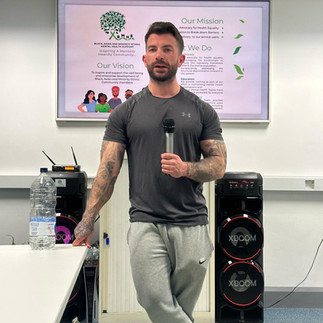
"Plating Wellness: A Journey into Healthy Eating with our Inspiring Guest Speaker" by Anum Mukhtar
- lynn
- Feb 29, 2024
- 2 min read
Childhood dietary habits are often imprinted on our minds. Exploring the impact of family culture on our relationship with food, understanding that habits passed down through generations can be deeply rooted. Many high-calorie dishes are associated with warmth and love in certain family cultures, making it challenging to detach emotions from eating habits.
Keeping in view, the challenge of accepting and transitioning from a diet ingrained with high-calorie and cooked foods to adopting a lifestyle centered around healthy eating; Bame Mental Health Support (BMHS) organised an educational workshop on ‘Healthy Eating Habits’ on 28 February 2024.

The purpose of the workshop was to provide information on the benefits of a balanced diet, offering resources on nutrition and healthy recipes to empower individuals to make informed choices. We were honored to host a remarkable guest speaker, ‘Adam-Rhys Davies’ who not only shared insightful knowledge but also demonstrated the art of crafting a balanced and nourishing "Eat Well Plate."
The audience consists of diverse community members, including Welsh, Asian, Africans. The BAME communities' migrants in Swansea are navigating a culinary journey that is both challenging and enriching. By embracing the diversity of available ingredients, fostering cultural exchange, and preserving culinary heritage, these communities are not just adapting but thriving in a new culinary landscape. Thus, the transition of their traditional eating habits in response to evolving weather conditions makes them worried about how to follow the right diet plan.
Therefore, the workshop helped participants to unveil the "Eat Well Plate" through Interactive Demonstration. Our guest speaker walked the audience through the process of creating an "Eat Well Plate." Highlighted the strategic placement of fruits, vegetables, proteins, grains, and dairy to achieve a harmonious balance.
Moreover, our esteemed guest speaker not only shared valuable insights into a balanced nutrition diet but also demonstrated effective exercise postures, that everyone can do at home. Hence, the workshop embarked on a journey towards holistic wellness that involved more than just mindful eating, it is a combination of nutrition and exercise.
Breaking free from ingrained dietary habits, especially those rooted in childhood and family culture, is undoubtedly a challenging journey. However, by acknowledging the influence of upbringing, embracing culinary traditions with a health-conscious mindset, and gradually implementing lifestyle changes, individuals can cultivate a healthier relationship with food. The transition may be challenging, but the rewards in terms of improved well-being and vitality are well worth the effort, creating a legacy of health for generations to come.
As we reflect on the BMHS workshop's holistic approach to wellness, the fusion of nutrition and exercise emerges as a powerful way for transformation. Let this be a blueprint for our journey towards holistic well-being, where nutrition and exercise harmonize to create a symphony of health that resonates through every aspect of our lives.









Comments